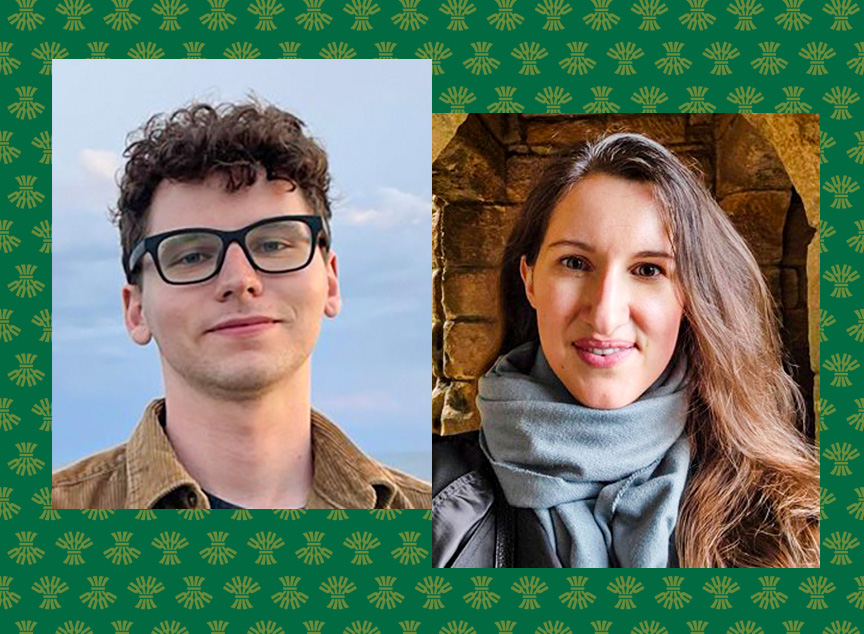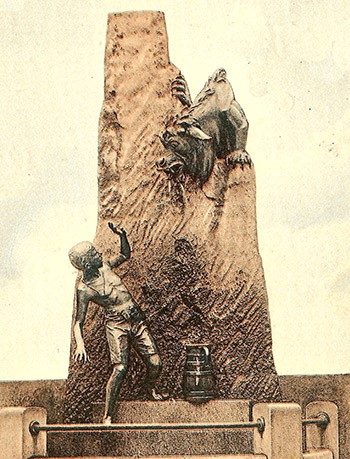
Tricia Monsour and Owen Schalk: In Conversation with our 2025 English Graduate Award Winners
Tricia Monsour and Owen Schalk share their amazing journeys!

By Diana Hope Tegenkamp
Tricia Monsour, recipient of the University of Saskatchewan Dissertation Award, Humanities and Fine Arts, attributes her discovery of The Castle of Tynemouth by Jane Harvey to fate.
"I went digging and stumbled across this WordPress article with a synopsis of Jane Harvey’s gothic novel,” says Tricia. She had expressed her desire to annotate an edition of 19th century gothic novel by a woman author to her thesis supervisor, Professor Emerita Lisa Vargo. Dr. Vargo established parameters she felt would set Tricia up for success, including a stipulation that the selected work had to have been published more than once.
Although Tricia found Harvey’s first chapter “a bit dry,” she kept going thanks to the intriguing WordPress synopsis, and "totally fell in love" with the book. One character in particular, Mrs. Cresswell, delighted her, adding humour into an otherwise dark gothic world.
In detective-like fashion, Tricia sometimes did weeks of research for one annotation or historical reference, distilling and choosing what to keep and what to leave out. Her goal was to provide just the right amount of information "so that a modern reader can appreciate the significance."
But when it came to piecing together archival research to get a more complete sense of Jane Harvey, Tricia struggled with her disappointment at how scattered and incomplete the information was for this pioneer of women's gothic fiction. “Women were writing considerably in the early 19th century,” Tricia says, “but they were largely facing criticism, so women novelists from this time period were often just forgotten."

Those who want to read Monsour's annotated edition of The Castle of Tynemouth will be pleased to know that the award-winning PhD student is now working on a proposal for the University of Wales Press, which has published previous editions of forgotten gothic novels. "I don't think it will be in people's hands in the new few months, but I’m hoping in the next couple of years."
When it comes to winning the University of Saskatchewan Dissertation Award for A Scholarly Edition of Jane Harvey's The Castle of Tynemouth, Tricia's eyes shine with emotion.
"During the four years of my PhD, I was taking care of my husband who was very ill and trying to juggle everything, trying to do the project justice. This was Doctor Vargo's last doctoral supervision, and I wanted to make her proud. So, it was gratifying just knowing that my committee members felt that it was worth a nomination. Winning the award was surreal. It's helps justify the support my amazing PhD committee so generously gave me."
To hear more from Tricia about her award-winning thesis, check out her recent interview on the Women's Print History Project Monthly Mercury Podcast, hosted by Department of English professor Kandice Sharren.
You can also read a shortened version of Tricia’s thesis abstract at the bottom of this article.

Owen Schalk, recipient of the University of Saskatchewan Master's Thesis Award, Humanities and Fine Arts, for his MFA in Writing thesis, Under Salted Earth, credits the excellent support he received through the writing program as key to his success.
"I came to the MFA with certain concerns at the forefront of my mind – but it wasn't until I started working with my supervisor Sheri Benning, and with Jeanette Lynes, and other writers in the program, that I was able to find a way to contain those ideas within a literary form."
Schalk's novel combines three genres: eco-fiction, prairie realism, and the New Weird. "All three genres deal with disruption," says Schalk with excitement, "and the efforts of characters to adapt to disruption. I find this very resonant with our current moment. Climate change is worsening. Our lives are at the mercy of the capitalist system. And in the New Weird, which focuses on the strange and the unsettling, there's this element of disorientation, in which unanticipated change is not necessarily bad but potentially positive, something which can spur new ways of thinking and being."
Under Salted Earth offers readers an intergenerational story of disruption, set in a rural Manitoba town. When the inhabitants, a mix of settlers and members of Indigenous communities, are confronted with a monstrous creature who arrives, demanding massive quantities of food, they are forced to come together in new ways.
"I wanted to see what would happen if I wrote around that idea of the monster, and as I kept writing, the more I found myself incorporating specifics of the small-town setting that I knew well, those charms of rural life, the strange characters and events your grandparents tell you about, and you think, could that have happened? Was that real?"
For the hungry monster in his novel, Schalk borrows from the figure of the Bahkauv, a German folkloric monster said to live in city tunnels and terrorize drunken men at night. The beastly figure that shows up in rural Manitoba is a more overt sinister presence, which is meant to connect to the less overt yet ever-present destructive element of agribusiness.

Schalk, who grew up in a rural Manitoba town, understands the harsh economic realities of small, single-family farming and credits the discipline of manual farm labour with instilling in him the work ethic needed to be a writer.
But, above all else, there is one focus which returns consistently in Schalk's discussion of his award-winning thesis: his commitment to writing with a social conscience and to connecting his writing to much-needed social change.
Citing writers who influenced him, he speaks about the "kind of curiosity that gets sparked in your mind when you read a great novel, no matter where the person's from." He then goes on to recall the scene from the novella, By Night in Chile, by Roberto Bolano, in which prisoners are being tortured in the basement of a house while the literary elite parties on the main floor.
"It made me think, what do I want to do as a writer? Do I want to be one of those writers who is upstairs partying? Or do I want to be a writer who draws attention to the people who are being tortured in the basement and tries to get them out?"
To learn more about Owen's novel, check out his thesis project artist statement.
As well, his thesis abstract is shared at the bottom of this article.
Abstract, A Scholarly Edition of Jane Harvey's The Castle of Tynemouth by Tricia Monsour
Tricia's dissertation presents the first scholarly edition of Jane Harvey’s second novel, The Castle of Tynemouth. First published in 1806, the novel was popular enough to be published again, by subscription, in 1830. In recovering this forgotten novel, Tricia included a comprehensive overview of Harvey’s critical reception in the nineteenth century and an analysis of how The Castle of Tynemouth is situated among the corpus of Harvey’s written works. The dissertation also includes an expanded biography of Harvey and an overview of her work in the book trade, as both an author and the proprietor of a circulating library in Tynemouth, England. Included with the novel are detailed annotations for the extensive historical and regional features, as well as for the literary references and quotations. Tricia makes the literary critical argument that Harvey’s novel can be considered “Gothic historical”; the dissertation focuses on reclaiming Harvey and her novel for modern scholarship.
Abstract, Under Salted Earth
Under Salted Earth is a novel that borrows from several genres such as the New Weird, prairie realism, and eco-fiction to explore the deleterious effects of industrial agriculture in rural Manitoba. The intergenerational plot, alternating between 1950 and the present day, involves the arrival of a beast based on the Bahkauv of German folklore, a creature from the city of Aachen which, according to legend, looked like a fanged calf and attacked intoxicated men at night. In my reworking of this old German tale, a similar beast travels to a village in rural Manitoba and demands massive quantities of food from its unprepared inhabitants. As such, the village – a mixture of inhabitants including settlers and members of Indigenous communities – must work together to appease it. Themes include displacement/dispossession, monstrosity and otherness, and the necessity of engaging critically with personal and regional histories to foster a more ecological way of being.


